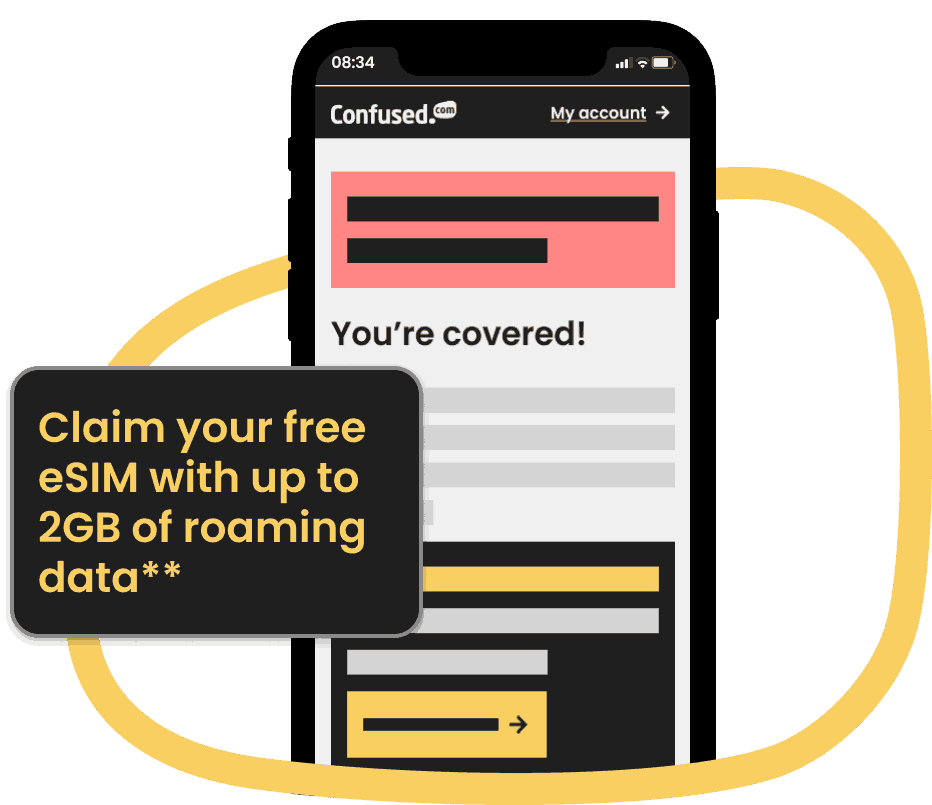"A pre-existing medical condition shouldn't stop you travelling! The most important thing is that you’re honest about your condition and any medication when you’re getting a quote. This will make sure that the quotes you see are appropriate for you, so you can relax and enjoy your holiday."
Can I get travel insurance if I have a medical condition?
Absolutely! If you're well enough to travel and haven't been advised against it by a doctor, you should be able to get travel insurance. Just be sure to let your insurer know about any medical conditions when purchasing your policy. It's really important for 2 main reasons:
-
You'll get the right coverage for your needs.
-
You won't invalidate your policy if you need to make a related claim.
Having a pre-existing medical condition might mean you pay a slightly higher premium, as there's a greater chance you'll need medical assistance while abroad. But, in most cases, getting a quote is straightforward—especially with our panel of insurers who cover a wide range of medical conditions!
It's a good idea to consider medical travel insurance as soon as you've booked your trip. By doing this, you'll be covered if you need to cancel because of unexpected illness. It'll also save you from the stress of sorting travel insurance close to your trip.
Struggling to get covered? Don't worry, you're not out of options.
If you're having trouble finding a policy, the Money and Pensions Service (MaPS) has a directory of travel insurers specifically for those with pre-existing conditions.
You can find the directory of insurers on the MoneyHelper website. You can also phone the MaPS for free, impartial advice on 0800 138 7777.
What's considered a pre-existing medical condition?
A pre-existing condition includes any health issue you've been diagnosed with or are being monitored for at the time of taking out your policy.
Here's some examples of pre-existing medical conditions:
- Asthma and other respiratory problems
- Diabetes, including type 1, type 2 and gestational diabetes
- Mental health conditions like depression or anxiety
- Cancer, even if you're in remission
- Heart conditions like coronary heart disease
- Joint and bone conditions like arthritis and rheumatism
- High blood pressure
- Stroke
- Epilepsy
If you're unsure about whether or not to mention a condition, just check with your insurer. They're there to help you! Declaring all your medical conditions is the easiest way to make sure you get the protection you need.
Just something to keep in mind—failing to declare a medical condition could mean you're not covered for any related medical treatment you might need. This could leave you with expensive medical bills to pay, especially if you need to be transported home for further treatment.
Enjoy your trip knowing you're covered
How to compare medical travel insurance quotes
Comparing travel insurance is easy with us! Here's how you can do it in 3 simple steps:
Fill out our quote form
We'll do the hard work
Compare quotes
How to get cheap travel insurance with a medical condition
If you're looking for travel insurance and have a medical condition, you might wonder how to keep costs down.
Like we've mentioned, the price of your travel insurance can depend on things like your age and how long you'll be travelling for. While you might not be able to change these factors, here's a few tips that could help you save on your insurance:
-
Increase your excess: The 'excess' is the portion you'd pay out of pocket if you make a claim. In general, the higher your excess, the lower your premium. Just make sure you're comfortable with the amount you choose so it's manageable if you do end up making a claim.
-
Consider the additional cover you need: Adding policy extras usually comes at an added cost. So, think realistically about what you'll need for this trip. If you're planning a beach holiday, you might not need the same level of cover as an adventure-packed getaway.
-
Compare travel insurance quotes: The simplest way to find a better price is to compare travel insurance quotes! This gives you a clearer picture of what different policies offer, so you can pick one that suits both your needs and budget.
-
Consider different policy types: Planning on travelling multiple times in a year? Consider multi-trip travel insurance. It might be cheaper and easier than buying separate policies each time.
By taking these steps, you'll give yourself a better chance of finding affordable cover that suits your travel plans and medical needs. Hooray!
What type of travel insurance can I get with a pre-existing condition?
What does medical travel insurance cover?
Exactly what's covered will vary between providers and policies. But, here's what's normally included on travel insurance:
-
Medical cover: You'll normally be covered for emergency medical treatment up to a set amount.
-
Repatriation cover: If a medical team decides it's necessary to fly you home for treatment, insurance can cover the costs.
-
Cancellation and curtailment cover: If you need to cancel or cut your trip short for unexpected reasons, your insurance can cover this.
-
Third party liability cover: You're normally covered if you injure someone or damage their property.
-
Travel disruption cover: Your travel insurance will cover the costs if bad weather, strikes or mechanical issues prevents you from travelling.
What isn't covered?
-
Undeclared pre-existing medical conditions. Emergency treatment for any undeclared medical conditions won't be covered.
-
Travelling against FCDO advice. If you travel to a country that the FCDO advises against, you won't be covered.
-
Incidents involving drugs or alcohol. If you become ill, injured or lose your belongings while under the influence, you won't be covered.
-
Known events. This includes things like natural disasters or extreme weather that occur before you buy your insurance.
-
Extreme sports or activities. Certain activities usually require a specialist adventure travel insurance policy. If you want to play a lot of golf on your trip, you could consider adding golf insurance. And, if your insurer doesn't cover scuba diving, you may want to consider adding scuba diving travel insurance to your policy.
-
Changing your mind. If you decide you just don't want to go on holiday, you won't be covered for anything you've already paid for.
What to consider before travelling with a pre-existing medical condition
A little planning can help when travelling with a pre-existing condition. Here's some tips to help you prepare:
-
Pack any medical equipment you use regularly. This might include inhalers, nebulisers and Continuous Positive Airway Pressure (CPAP) machines. And, if you need to travel with an oxygen cylinder, you should contact your airline before travelling to check for any restrictions.
-
Get a doctor’s advice before you travel. A quick chat with your doctor can be helpful. They can give you guidance on what kind of travel and activities might be suitable for you and your condition.
-
Pack your doctor’s letter, if you’ve been advised to take one. These are sometimes called fit notes and confirm that you're well enough to travel. It might come in handy if you're questioned about your health.
-
Research your destination in advance, so you know exactly where to find the nearest doctor, clinic, pharmacy and hospital.
-
Pack enough medication for your trip. Make sure you have enough medication for your entire trip! Keep them in your hand luggage so they don't get lost. It's also a good idea to bring a copy of your prescription and to keep medications in their original packaging. This should help to prevent issues at security or customs.
-
Check the rules around bringing medication into the country. Some countries have strict rules about certain medications, so check with your GP or pharmacist if your meds contain any controlled substances. You might need a prescription or a letter from your doctor for travel.
-
Pack your Global Health Insurance Card (GHIC). If you're travelling to an EU country, bring your GHIC or a still-valid European Health Insurance Card (EHIC). These cards give you access to healthcare at the same cost as locals. But, remember, they're not a substitute for travel insurance. Some insurers even require you to have one as a condition of coverage!
Why compare medical travel insurance with Confused.com?
There's plenty of great reasons why you should consider us! Here's just a few:
-
We work closely with a panel of 431 trusted UK travel insurers. We compare your details against all of them to show you our best quotes.
-
We're 100% independent. This means we're not owned by any insurance company, so the prices you see are our best available based on your information, not who they're from.
-
Our expert panel reviews all content. Learn more about our editorial standards and how we operate.
-
We value your privacy and security, and we promise to look after your personal details. You can read more about this on our security and privacy policy page.
Our customers say:
Frequently asked questions
Does it matter where I'm travelling to?
Yes, your destination can affect the cost of travel insurance, especially in places with pricier medical care. For example, travel insurance for the USA is often more expensive than travel insurance for Spain.
The IAS - one of the providers of medical repatriation for UK nationals - estimates that returning home from the USA to the UK could cost £50,000. And, from Brazil, it could be more expensive at £85,000!
Without travel insurance, you might have to pay these costs yourself. So, it's a good idea to think about getting a policy before your trip.
Do I need to declare any medications I'm taking?
You might!
Let's take a closer look at the main situations you might need to:
-
While taking out travel insurance. Whether you need to declare a medication depends on what it is and your insurer's requirements. If in doubt, just check with your insurer, they'll help clarify which medications they need to know about.
-
When going through customs or security. Depending on what medication you have, you might need to show proof that it's been prescribed to you at customs or at security. So, make sure you bring your prescription and any other relevant documentation with you.
Are there any conditions that don't need to be declared?
Yes! There's some things that don't usually need to be declared. Here's some common ones:
-
Pregnancy: Being pregnant isn't usually considered a pre-existing medical condition unless you have complications. Yay! And, just a reminder, most insurers don't cover pregnancy after 37 weeks. If you're having twins, the cut-off is around 32 weeks. Read more about pregnancy travel insurance.
-
Contraceptives: When you get a quote, there's no need to tell us about any contraceptives your doctor has prescribed.
-
Painkillers or antibiotics: In most cases, your insurer doesn't need to know if you've recently been prescribed painkillers or antibiotics. The exception to this is if your prescription is for an ongoing or chronic condition. Like we've mentioned, just talk to your insurer if you're unsure about anything.
Is pregnancy a pre-existing medical condition?
Pregnancy isn't considered a medical condition. So, there's usually no need to declare it when taking out a quote. Boom!
But, if you've experienced any complications related to pregnancy, you'll need to let your insurer know. It's also worth declaring that you're expecting if you're in your 3rd trimester. This is because most insurers only cover up to 37 weeks due to the increased chance of going into labour. You can read more about travelling while pregnant.
When in doubt, just reach out to your travel insurer!
What if I don't declare a condition?
Not declaring a medical condition can invalidate your travel insurance, meaning any claims you make could be declined. Being upfront when getting quotes ensures you'll have the coverage you need. So, you can focus on other things—like enjoying your holiday!
When should I buy travel insurance?
Ideally, as soon as you've booked your trip! Buying travel insurance early means you're covered for unexpected issues before your departure. For instance, if you become unwell and can no longer travel, your insurance can help cover any prepaid costs.
Waiting to buy travel insurance last minute means you could be at risk of losing out if something goes wrong!
Do I need travel insurance if I have an EHIC or GHIC?
Travel insurance isn't a legal requirement in the majority of places. But, taking out a policy is still worth thinking about.
An EHIC or GHIC card can provide access to essential, state-level healthcare. So, this means paying the same price for medical care as citizens of the country you're in. In certain destinations, you could even get it for free. But, it's important to note that these cards won't cover things like medical repatriation. This means being returned to the UK for treatment, and can cost thousands without insurance.
Despite this, it's still worth travelling with one. You can use it alongside your insurance to make sure you're able to access the medical care you need. Oh, and just a heads up— some travel insurers can even ask you to get one as a condition of your policy!
What if I'm diagnosed with a medical condition after I've bought my insurance?
If you're diagnosed with a new condition after purchasing your policy, let your insurer know as soon as possible. They might need to adjust your policy to ensure you're getting the right level of cover. Being upfront with your insurer will help avoid invalidating your policy if you need related treatment while abroad. Phew!
Can I get travel insurance if I'm waiting for a diagnosis?
We understand waiting for a diagnosis can be stressful, and you might want nothing more than to get away on a well-deserved holiday.
But, it's best to wait until you receive your test results before buying travel insurance. The same applies if you're awaiting surgery. This way, you can provide accurate information to your insurer and ensure you get the right cover for your needs.
Read our guides on travelling with medical conditions
What are the different types of travel insurance?
Our service is free and compares a wide range of trusted household names. Confused.com is an intermediary and receives commission from theidol.com if you decide to buy through our website which is based on a percentage of the total annual premium. We pride ourselves on impartiality and independence – therefore we don't promote any one insurance provider over another.





















